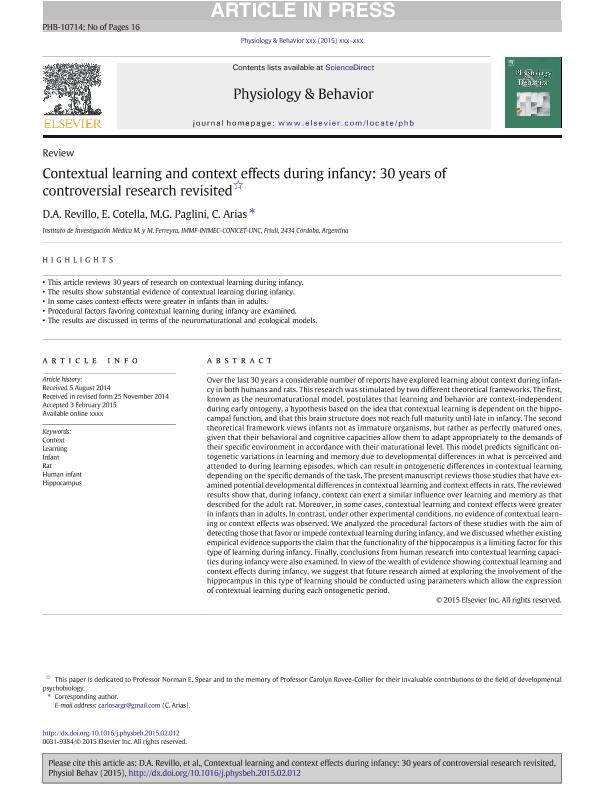Mostrar el registro sencillo del ítem
dc.contributor.author
Revillo, Damian Alejandro

dc.contributor.author
Cotella, Evelin Mariel

dc.contributor.author
Paglini, Maria Gabriela

dc.contributor.author
Arias Grandio, Carlos

dc.date.available
2018-06-27T20:57:32Z
dc.date.issued
2015-02
dc.identifier.citation
Revillo, Damian Alejandro; Cotella, Evelin Mariel; Paglini, Maria Gabriela; Arias Grandio, Carlos; Contextual learning and context effects during infancy: 30years of controversial research revisited; Pergamon-Elsevier Science Ltd; Physiology And Behavior; 148; 2-2015; 6-21
dc.identifier.issn
0031-9384
dc.identifier.uri
http://hdl.handle.net/11336/50300
dc.description.abstract
Over the last 30. years a considerable number of reports have explored learning about context during infancy in both humans and rats. This research was stimulated by two different theoretical frameworks. The first, known as the neuromaturational model, postulates that learning and behavior are context-independent during early ontogeny, a hypothesis based on the idea that contextual learning is dependent on the hippocampal function, and that this brain structure does not reach full maturity until late in infancy. The second theoretical framework views infants not as immature organisms, but rather as perfectly matured ones, given that their behavioral and cognitive capacities allow them to adapt appropriately to the demands of their specific environment in accordance with their maturational level. This model predicts significant ontogenetic variations in learning and memory due to developmental differences in what is perceived and attended to during learning episodes, which can result in ontogenetic differences in contextual learning depending on the specific demands of the task. The present manuscript reviews those studies that have examined potential developmental differences in contextual learning and context effects in rats. The reviewed results show that, during infancy, context can exert a similar influence over learning and memory as that described for the adult rat. Moreover, in some cases, contextual learning and context effects were greater in infants than in adults. In contrast, under other experimental conditions, no evidence of contextual learning or context effects was observed. We analyzed the procedural factors of these studies with the aim of detecting those that favor or impede contextual learning during infancy, and we discussed whether existing empirical evidence supports the claim that the functionality of the hippocampus is a limiting factor for this type of learning during infancy. Finally, conclusions from human research into contextual learning capacities during infancy were also examined. In view of the wealth of evidence showing contextual learning and context effects during infancy, we suggest that future research aimed at exploring the involvement of the hippocampus in this type of learning should be conducted using parameters which allow the expression of contextual learning during each ontogenetic period.
dc.format
application/pdf
dc.language.iso
eng
dc.publisher
Pergamon-Elsevier Science Ltd

dc.rights
info:eu-repo/semantics/openAccess
dc.rights.uri
https://creativecommons.org/licenses/by-nc-sa/2.5/ar/
dc.subject
Context
dc.subject
Hippocampus
dc.subject
Human Infant
dc.subject
Infant
dc.subject
Learning
dc.subject
Rat
dc.subject.classification
Psicología

dc.subject.classification
Psicología

dc.subject.classification
CIENCIAS SOCIALES

dc.title
Contextual learning and context effects during infancy: 30years of controversial research revisited
dc.type
info:eu-repo/semantics/article
dc.type
info:ar-repo/semantics/artículo
dc.type
info:eu-repo/semantics/publishedVersion
dc.date.updated
2018-06-26T13:42:01Z
dc.journal.volume
148
dc.journal.pagination
6-21
dc.journal.pais
Estados Unidos

dc.journal.ciudad
Amsterdam
dc.description.fil
Fil: Revillo, Damian Alejandro. Consejo Nacional de Investigaciones Científicas y Técnicas. Centro Científico Tecnológico Conicet - Córdoba. Instituto de Investigación Médica Mercedes y Martín Ferreyra. Universidad Nacional de Córdoba. Instituto de Investigación Médica Mercedes y Martín Ferreyra; Argentina
dc.description.fil
Fil: Cotella, Evelin Mariel. Consejo Nacional de Investigaciones Científicas y Técnicas. Centro Científico Tecnológico Conicet - Córdoba. Instituto de Investigación Médica Mercedes y Martín Ferreyra. Universidad Nacional de Córdoba. Instituto de Investigación Médica Mercedes y Martín Ferreyra; Argentina
dc.description.fil
Fil: Paglini, Maria Gabriela. Consejo Nacional de Investigaciones Científicas y Técnicas. Centro Científico Tecnológico Conicet - Córdoba. Instituto de Investigación Médica Mercedes y Martín Ferreyra. Universidad Nacional de Córdoba. Instituto de Investigación Médica Mercedes y Martín Ferreyra; Argentina
dc.description.fil
Fil: Arias Grandio, Carlos. Consejo Nacional de Investigaciones Científicas y Técnicas. Centro Científico Tecnológico Conicet - Córdoba. Instituto de Investigación Médica Mercedes y Martín Ferreyra. Universidad Nacional de Córdoba. Instituto de Investigación Médica Mercedes y Martín Ferreyra; Argentina
dc.journal.title
Physiology And Behavior

dc.relation.alternativeid
info:eu-repo/semantics/altIdentifier/doi/http://dx.doi.org/10.1016/j.physbeh.2015.02.012
Archivos asociados
